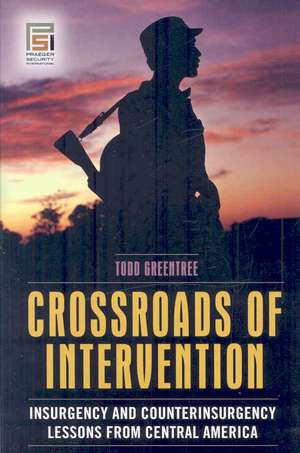Crossroads of Intervention: Insurgency and Counterinsurgency Lessons from Central America: Praeger Security International
Autor Todd Greentreeen Limba Engleză Hardback – 29 mar 2008 – vârsta până la 17 ani
Din seria Praeger Security International
- 18%
 Preț: 334.19 lei
Preț: 334.19 lei - 8%
 Preț: 335.53 lei
Preț: 335.53 lei - 34%
 Preț: 376.10 lei
Preț: 376.10 lei - 46%
 Preț: 443.64 lei
Preț: 443.64 lei - 29%
 Preț: 240.11 lei
Preț: 240.11 lei - 8%
 Preț: 304.56 lei
Preț: 304.56 lei - 34%
 Preț: 373.82 lei
Preț: 373.82 lei - 19%
 Preț: 412.79 lei
Preț: 412.79 lei - 19%
 Preț: 338.42 lei
Preț: 338.42 lei - 18%
 Preț: 335.62 lei
Preț: 335.62 lei - 27%
 Preț: 377.35 lei
Preț: 377.35 lei - 27%
 Preț: 376.75 lei
Preț: 376.75 lei - 18%
 Preț: 336.46 lei
Preț: 336.46 lei - 18%
 Preț: 321.73 lei
Preț: 321.73 lei - 27%
 Preț: 384.51 lei
Preț: 384.51 lei - 18%
 Preț: 320.50 lei
Preț: 320.50 lei - 18%
 Preț: 320.50 lei
Preț: 320.50 lei - 18%
 Preț: 321.35 lei
Preț: 321.35 lei - 24%
 Preț: 420.54 lei
Preț: 420.54 lei - 14%
 Preț: 335.99 lei
Preț: 335.99 lei - 18%
 Preț: 355.82 lei
Preț: 355.82 lei - 18%
 Preț: 319.83 lei
Preț: 319.83 lei - 18%
 Preț: 334.28 lei
Preț: 334.28 lei - 32%
 Preț: 354.48 lei
Preț: 354.48 lei - 14%
 Preț: 335.14 lei
Preț: 335.14 lei - 38%
 Preț: 405.98 lei
Preț: 405.98 lei - 40%
 Preț: 571.34 lei
Preț: 571.34 lei - 18%
 Preț: 321.85 lei
Preț: 321.85 lei - 18%
 Preț: 323.25 lei
Preț: 323.25 lei - 18%
 Preț: 253.28 lei
Preț: 253.28 lei - 40%
 Preț: 571.50 lei
Preț: 571.50 lei - 14%
 Preț: 333.72 lei
Preț: 333.72 lei - 18%
 Preț: 301.73 lei
Preț: 301.73 lei - 19%
 Preț: 352.96 lei
Preț: 352.96 lei - 26%
 Preț: 387.80 lei
Preț: 387.80 lei - 18%
 Preț: 302.77 lei
Preț: 302.77 lei - 14%
 Preț: 333.91 lei
Preț: 333.91 lei - 17%
 Preț: 325.80 lei
Preț: 325.80 lei - 24%
 Preț: 338.58 lei
Preț: 338.58 lei - 34%
 Preț: 414.73 lei
Preț: 414.73 lei - 18%
 Preț: 354.30 lei
Preț: 354.30 lei - 29%
 Preț: 254.29 lei
Preț: 254.29 lei - 18%
 Preț: 354.11 lei
Preț: 354.11 lei - 18%
 Preț: 334.38 lei
Preț: 334.38 lei - 14%
 Preț: 302.68 lei
Preț: 302.68 lei - 18%
 Preț: 322.97 lei
Preț: 322.97 lei - 27%
 Preț: 376.50 lei
Preț: 376.50 lei - 27%
 Preț: 322.81 lei
Preț: 322.81 lei - 27%
 Preț: 382.91 lei
Preț: 382.91 lei - 18%
 Preț: 320.87 lei
Preț: 320.87 lei
Preț: 321.17 lei
Preț vechi: 391.84 lei
-18% Nou
Puncte Express: 482
Preț estimativ în valută:
61.45€ • 64.34$ • 50.85£
61.45€ • 64.34$ • 50.85£
Carte tipărită la comandă
Livrare economică 07-21 aprilie
Preluare comenzi: 021 569.72.76
Specificații
ISBN-13: 9780275992156
ISBN-10: 0275992152
Pagini: 220
Dimensiuni: 156 x 235 x 22 mm
Greutate: 0.48 kg
Editura: Bloomsbury Publishing
Colecția Praeger
Seria Praeger Security International
Locul publicării:New York, United States
ISBN-10: 0275992152
Pagini: 220
Dimensiuni: 156 x 235 x 22 mm
Greutate: 0.48 kg
Editura: Bloomsbury Publishing
Colecția Praeger
Seria Praeger Security International
Locul publicării:New York, United States
Notă biografică
TODD GREENTREE is a Visiting Scholar at the Johns Hopkins University School of Advanced International Studies and teaches national security studies and international politics at the University of New Mexico. He is a former Professor of Strategy and Policy at the U.S. Naval War College. Greentree's personal experience with irregular warfare extends from El Salvador and Nicaragua to Angola, where he served as U.S. Foreign Service Officer.
Cuprins
Foreword (Robert W. Tucker)Preface1. Introduction: The Strategy and Policy of Intervention in Central America2. What Was at Stake?3. The Problem of Limits4. Nicaragua: The Fall of Somoza and the Triumph of the Sandinistas5. El Salvador: Reform with Repression6. The Contra War: Revolution, Counter-Revolution, and the Cold War7. Every War Must End8. Epilogue and AftermathNotesSelected ReadingsIndex
Recenzii
In the author's view, U.S. involvement in Central America during the 1980s clearly demonstrated the limits of intervention and use of force in internal conflicts. He believes that much can be learned today from our experience in those cases because, while U.S. aims were achieved, the operations had no tangible impact on the greater purpose -- the Cold War overall.
[An] excellent and very timely book. Greentree's book is an excellent place to start for those who would like to refresh their memories about this critical era in the history of irregular warfare.
American policymakers.like anyone else who wants to learn about those conflicts, would profit greatly from reading this.very useful study.
[An] excellent and very timely book. Greentree's book is an excellent place to start for those who would like to refresh their memories about this critical era in the history of irregular warfare.
American policymakers.like anyone else who wants to learn about those conflicts, would profit greatly from reading this.very useful study.
